As @Gnimuc states in his comment, you should not benchmark in global scope, and benchmarks are best done using BenchmarkTools.jl - here are the timings done right:
julia> methodA(json_in) = reduce(vcat,[cust["transactions"] for cust in json_in])
method1 (generic function with 1 method)
julia> methodB(json_in) = vcat(json_in[1]["transactions"],json_in[2]["transactions"],json_in[3]["transactions"])
method2 (generic function with 1 method)
#Gnimuc's syntax from his comment
julia> methodC(json_in) = mapreduce(x->x["transactions"], vcat, json_in)
method3 (generic function with 1 method)
julia> using BenchmarkTools
julia> @benchmark methodA(json_in)
BenchmarkTools.Trial:
memory estimate: 38.15 MiB
allocs estimate: 15
--------------
minimum time: 10.584 ms (3.10% GC)
median time: 14.781 ms (32.02% GC)
mean time: 15.112 ms (32.19% GC)
maximum time: 69.341 ms (85.28% GC)
--------------
samples: 331
evals/sample: 1
julia> @benchmark methodB(json_in)
BenchmarkTools.Trial:
memory estimate: 22.89 MiB
allocs estimate: 2
--------------
minimum time: 5.921 ms (5.92% GC)
median time: 8.402 ms (32.48% GC)
mean time: 8.701 ms (33.46% GC)
maximum time: 69.268 ms (91.09% GC)
--------------
samples: 574
evals/sample: 1
julia> @benchmark methodC(json_in)
BenchmarkTools.Trial:
memory estimate: 38.15 MiB
allocs estimate: 12
--------------
minimum time: 10.599 ms (3.37% GC)
median time: 14.843 ms (32.12% GC)
mean time: 15.228 ms (32.24% GC)
maximum time: 71.954 ms (85.95% GC)
--------------
samples: 328
evals/sample: 1
Method B is still like twice as fast. That is exactly because it is more specialized, on an array with exactly three elements.
An alternative solution that might work well here is to use a MappedArray, which creates a lazy view into the original array:
using MappedArrays
method4(json_in) = mappedarray(x->x["transactions"], json_in)
Of course this doesn't concatenate the arrays, but you can concatenate views using the CatView package:
using CatViews
julia> method5(json_in) = reduce(CatView, mappedarray(x->x["transactions"], json_in))
method5 (generic function with 1 method)
julia> @benchmark method5(json_in)
BenchmarkTools.Trial:
memory estimate: 1.73 KiB
allocs estimate: 46
--------------
minimum time: 23.320 μs (0.00% GC)
median time: 23.916 μs (0.00% GC)
mean time: 25.466 μs (0.00% GC)
maximum time: 179.092 μs (0.00% GC)
--------------
samples: 10000
evals/sample: 1
Because it doesn't allocate it is like 300x faster than method B (but it's possible it's slower to use the result because of nonlocality - worth benchmarking).
